
Small elite network and less formal governance structure: Efficient knowledge sharing and rapid policy responses?
M. Ackrén, N. Hokkala, P. Lægreid, E. Palmujoki, A. Trengereid, Á. E. Bernhardsdóttir, M. Koraeus, R. Olavson, B. Thorhallsson and K. Vrangbæk (pages 423-440)
This paper analyzes whether the seven Nordic countries, by virtue of their limited administrative size and less formalized governance arrangements, were particularly well-suited to fostering rapid …

Cooperation problems and bureaucratic infighting in small states: Lack of planning and unclear rules?
M. Ackrén, N. Hokkala, P. Lægreid, E. Palmujoki, A. Trengereid, Á. E. Bernhardsdóttir, M. Koraeus, R. Olavson, B. Thorhallsson and K. Vrangbæk (pages 409-422)
This comparative study of the seven Nordic countries supports the assumption that cooperation problems and bureaucratic infighting in small states during the early stages of the …

The effect of size and the Nordic states’ responses to the COVID-19 pandemic: Reactive or proactive?
M. Ackrén, N. Hokkala, P. Lægreid, E. Palmujoki, A. Trengereid, Á. E. Bernhardsdóttir, M. Koraeus, R. Olavson, B. Thorhallsson and K. Vrangbæk (pages 389-408)
This paper examines whether the small size of the public administration of the seven Nordic countries affected the nature of their crisis responses, focusing on the …

Introduction: Nordic countries’ crisis management of the COVID-19 pandemic: The effect of size
The effect of size – Á. E. Bernhardsdóttir and B. Thorhallsson (pages 375-388).

A Special Section - The Nordic Countries’ crisis management of the Covid-19 pandemic: The effect of size
Guest Editors: Ásthildur Elva Bernhardsdóttir and Baldur Thorhallsson in the journal Small States & Territories (ISSN: 2616-8006), Vol. 8, No. 2, November 2025, (pages 375-440).
This special section in SST deals with size-related challenges and opportunities in the seven Nordic countries (Sweden, Norway, Denmark, Finland, Iceland, Greenland and the Faroe …

News Credibility in the Age of Misinformation - RECLAIM Discussion Paper 2025/3
Project: RECLAIM
Authors: Martin Moland, Jacopo Custodi, Hans-Jörg Trenz and Asimina Michailidou
A large literature investigates what shapes people’s people’s perceptions of fake news. However, much of this literature has concerned itself with social media, ignoring the legacy media that still play an integral part in many people’s news diets. …

Reimagining the International as a Challenge to Liberal Democracy - RECLAIM Discussion Paper 2025/2
Project: RECLAIM
Authors: Ondřej Ditrych, Jakub Eberle, Linda Monsees and Petr Kratochvil
This report returns to the recent history of the covid pandemic, rising populism and foreign information manipulation and interference (FIMI) by Russia and China to explore how the crisis it produced shaped the contestation between strategic disinformation campaigns …

Reclaiming the Epistemic Basis of Liberal Democracy - RECLAIM Discussion Paper 2025/1
Project: RECLAIM
Author: Maximilian Conrad
This discussion paper outlines the RECLAIM project’s ideal-typical understanding of the post-truth condition. Such an ideal-typical understanding is necessary as a heuristic device for the empirical analysis of the various phenomena that – collectively and through their interplay – constitute the post-truth phenomenon. Moreover, an …

Post-Truth Politics in Action? Representation of the Media in Spanish Radical Parties’ Electoral Campaigns
Project: RECLAIM
Authors: Taru Haapala and Juan Roch
ecent research on the EU institutional response to post-truth politics has shown a gradual shift of focus from external threats to internal democratic challenges, including populist parties and elections. The case of Spain is particularly relevant as the country’s “disinformation landscape” has …

The EU’s FIMI Turn: How the European Union External Action Service Reframed the Disinformation Fight
Project: RECLAIM
Authors: Lucas Proto, Paula Lamoso-González and Luis Bouza García
This article critically examines the strategic decision of the European Union External Action Service (EEAS) to reframe the concept of misinformation as Foreign Information Manipulation and Interference. The EEAS, particularly its Strategic Communications Division, has been at the forefront …

How the EU Counters Disinformation: Journalistic and Regulatory Responses
Project: RECLAIM
Authors: Jorge Tuñón Navarro, Luis Bouza García and Alvaro Oleart
Social media companies have strengthened their power—both discursive and political—during the last decade, a process that has disrupted the public spheres, contributing to shaping the way in which public discourse unfolds. In this process, it has empowered anti-democratic …

Reversing the Privatisation of the Public Sphere: Democratic Alternatives to the EU’s Regulation of Disinformation
Project: RECLAIM
Authors: Alvaro Oleart and Julia Rone
The emergence of social media companies, and the spread of disinformation as a result of their “surveillance capitalist” business model, has opened wide political and regulatory debates across the globe. The EU has often positioned itself as a normative leader and standard-setter, …

Reinforcing or Rethinking? What Do News Consumers Want From Journalism in the Post-Truth Era?
Project: RECLAIM
Authors: Martin Moland (ARENA), Jacopo Custodi (SNS), Hans-Jörg Trenz (SNS)
This article utilizes primary data from a survey (N = 4,521) fielded in Norway, Italy, and Poland in 2023 to show that, even in contemporary media environments, people continue to regard traditional journalistic ideals as the normative …

Process tracing, QCA and SNA analytical and methodological details
Project: RECLAIM
Authors: Luis Bouza García (UAM), Álvaro Oleart (ULB), Rocío Sánchez del Vas (UC3M) and Juan Roch (UNED)
The objective of WP7 is to analyse how normative conceptions of public debate in democracy relate to different policy alternatives and political strategies to fight disinformation by using political theory to …

Polarisation, News Consumption, and Beliefs in Misinformation and Conspiracy Theories: Early Signs of the Fragmentation of the Public Sphere in Iceland
Project: RECLAIM
Special Issue: Javnost - The Public
Authors: Jón Gunnar Ólafsson & Valgerður Jóhannsdóttir
A common explanation linked to increased polarisation has focused on changes in citizens’ information diets, with like-minded people apparently becoming increasingly isolated in online echo chambers. This article investigates whether news audience polarisation has increased …

Exploring affective Polarisation of the (Digital) Public Sphere in Slovenia: The Case of Marshal Twito
Project: RECLAIM
Special Issue: Javnost - The Public
Authors: Melika Mahmutović & Marko Lovec
The last decade saw the issue of polarisation garnering increased scholarly attention. While political polarisation has been almost unequivocally studied as synonymous with ideological polarisation, scholars have recently addressed polarisation along partisan lines manifesting through strong …

Does the Centre Hold? Public Sphere Configuration, Democracy, and the Quality of Political Talk in Sweden
Project: RECLAIM
Special Issue: Javnost - The Public
Author: Peter Strandbrink
In the present article, key conceptual and regulative requirements for quality public democratic talk to be maintained are identified and the linguistic economy of civic conversation about common affairs in the Swedish public sphere gauged; the relationship between public …

Fragmented and Polarised? The German Public Sphere during the Russian Invasion of Ukraine
Project: RECLAIM
Special Issue: Javnost - The Public
Author: Maximilian Conrad
The digital age has brought about fundamental questions about the viability of the public sphere. While a shared and inclusive communicative space is widely considered to be a fundamental requirement for democratic deliberation, the rise of social (and other …

What Is the EU’s Vision of Democracy in the Post-Truth Scenario? A Conceptual Analysis of the Institutional Narratives of the Public Sphere in the “Democracy Action Plan”
Project: RECLAIM
Special Issue: Javnost - The Public
Authors: Elena García-Guitián, Luis Bouza & Taru Haapala
Contributing to recent academic and public debates on how European democracies should respond to a scenario of “post-truth politics”, this article explores the idea of democracy that underlies current regulatory responses in the “European …

Not About Facts, but Emotions? Political Polarisation as a Problem of Redescription
Project: RECLAIM
Special Issue: Javnost - The Public
Author: Jeremias Schledorn
Political polarisation, e.g. following the refugee movements of 2015 or the Covid pandemic, is often explained by emotions. The latter are widely exploited as a political strategy, while points of view are often discredited as based on mere emotion …

Fugitive Truth: Renewing the Public Sphere in the Age of Post-Truth
Project: RECLAIM
Special Issue: Javnost - The Public
Author: Saul Newman
In the sixty years since the publication of Jürgen Habermas' magnum opus, The Structural Transformation of the Public Sphere, the public sphere now faces a new threat in the era of “post-truth” politics. The preponderance of lies, mis/disinformation, “fake …

Civil society coalitions in the EU media regulation: when field theory meets network analysis
Project: RECLAIM
Authors: Luis Bouza, Juan Roch and Álvaro Oleart
The field of Eurocracy has increasingly been shaped by the emergence of actors lobbying on the area of digital regulation, which has heavily increased during the Von der Leyen Commission. We study the extra-institutional actor networks that have been involved …

Journalists’ responses: Case studies comparative report
Project: RECLAIM
Authors of the Report: Jacopo Custodi (SNS), Hans-Joerg Trenz (SNS) and Martin Moland (ARENA)
This report presents and analyses the comparative results of an investigation conducted in late 2023 and early 2024 on journalism and its relationship with the issue of dis/misinformation in 7 different countries – Poland, …

Post-Truth Populism: A New Political Paradigm
Editors: Saul Newman and Maximilian Conrad
Project: RECLAIM
This open access book analyses the convergence between ‘post-truth’ political culture and the politics of populism. The premise is that there is an intrinsic link between post-truth discourse (referring to mis/disinformation, ‘alternative facts’, ‘fake news’, conspiracy theories and the general distrust of …
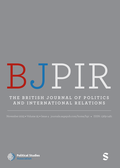
Post-truth politics as discursive violence: Online abuse, the public sphere and the figure of ‘the expert’
Charlotte Galpin and Patrick Vernon, University of Birmingham
British Journal of Politics and International Relations, 2023
Project: Post-Truth
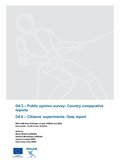
Public opinion survey: Country comparative reports and Citizens’ experiments: Data report
Project: RECLAIM
Authors: Martin Moland (ARENA), Asimina Michailidou (ARENA), Jacopo Custodi (SNS) and Hans-Jörg Trenz (SNS)
This report begins by presenting country-level responses to questions regarding journalistic characteristics, functions, their perceived importance and fact-checking (D4.3). Subsequently, we present the results of our survey experiment (D4.6).
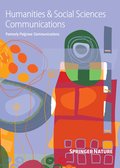
The European approach to online disinformation: geopolitical and regulatory dissonance
Authors: Andreu Casero-Ripollés, Jorge Tuñón and Luis Bouza-García
Project: RECLAIM
The COVID-19 health crisis and the invasion of Ukraine have placed disinformation in the focus of European policies. This article aims to analyze the emerging European policy on counter-disinformation practices and regulations. To this end the article examines developing European …

Regulating Disinformation and Big Tech in the EU: A Research Agenda on the Institutional Strategies, Public Spheres and Analytical Challenges
Authors: Luis Bouza García and Alvaro Oleart
Project: RECLAIM
The growing influence of social media platforms, and the disinformation that circulates in them, has transformed the public spheres. How to deal with disinformation is an open normative, empirical and political question in contemporary democracies. This article, outlines an agenda on …
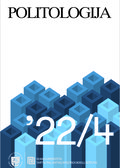
Economic Adaptability in the Absence of Democratic Corporatism: Explaining Lithuania’s Export Performance
Vytautas Kuokštis and Ramūnas Vilpišauskas - Vilnius University
Project: NAS
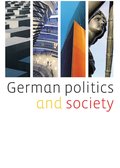
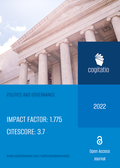
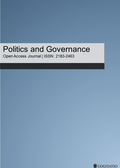
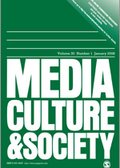
Rethinking journalism standards in the era of post-truth politics: from truth keepers to truth mediators
Asimina Michailidou, ARENA Centre for European Studies, University of Oslo & Hans-Jörg Trenz, Scuola Normale Superiore
Media, Culture and Society, 2021
Project: Post-Truth
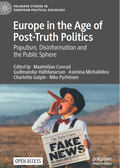
Europe in the Age of Post-Truth Politics
Maximilian Conrad, Guðmundur Hálfdanarson, Asimina Michailidou, Charlotte Galpin, Niko Pyrhönen (Editors)
Part of the book series: Palgrave Studies in European Political Sociology (PSEPS)
Project: Post-Truth Politics
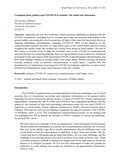
Communication, politics and COVID-19 in Iceland: The small state dimension
Jón Gunnar Ólafsson - University of Iceland, Faculty of Political Science
2021
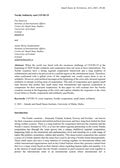
Nordic Solidarity and Covid-19
Pia Hansson and Auður Birna Stefánsdóttir - University of Iceland, Centre for Small State Studies
2021
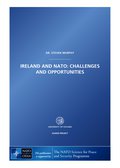
Ireland and NATO: Challenges and Opportunities
Steven Murphy - University of Iceland
Project: SSANSE
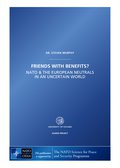
Friends With Benefits: NATO and the European Neutrals in an Uncertain World
Steven Murphy - University of Iceland
Project: SSANSE
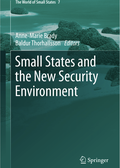
Small States and the New Security Environment
This book examines the security, defence and foreign policy choices and challenges of small states in NATO and its small partner states in the new security environment.
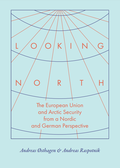
Iceland and Arctic Security: US Dependency and the Search for an Arctic Identity
Iceland and Arctic Security: US Dependency and the Search for an Arctic Identity

On Thin Ice? Perspectives on Arctic Security
On Thin Ice? Perspectives on Arctic Security
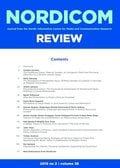
Superficial, shallow and reactive: How a small state news media covers politics
This article illustrates how the crisis of the news media is impacting political coverage in Iceland. Perceptions of routine political coverage in the Icelandic media have not been studied before, and this article fills this research gap and situates the Icelandic case within the wider news media crisis literature.
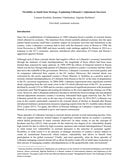
Flexibility as Small State Strategy: Explaining Lithuania’s Adjustment Successes
Vytautas Kuokštis, Ramūnas Vilpišauskas, Algirdas Bieliūnas - Vilnius University
Project: NAS
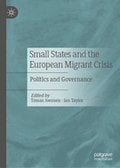
Small States and the European Migrant Crisis: Politics and Governance
Editors: Tómas Joensen, University of Iceland and Ian Taylor, St. Andrews University
Project: NAS
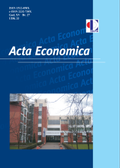
An Insight Into Potential Fiscal Implications of the Great Lockdown from the Perspective of Small States
Primoz Pevcin - University of Ljubljana
Project: NAS
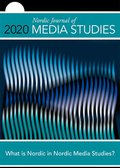
Factoring Size into the Equation: Media studies, politics, and small states
Jón Gunnar Ólafsson, Goldsmiths - University of London, UK
Nordic Journal of Media Studies
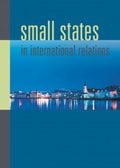
Small States in International Relations
Edited by Christine Ingebritsen, Iver B. Neumann, Sieglinde Gstöhl and Jessica Beyer
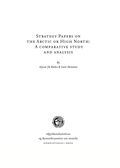
Strategy Papers on the Arctic or High North: A Comparative Study and Analysis
Alyson JK Bailes & Lassi Heininen
2013
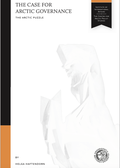
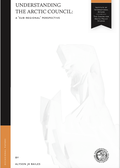
Understanding the Arctic Council: A ‘Sub-Regional’ Perspective
Alyson JK Bailes
2014
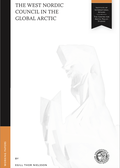
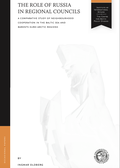
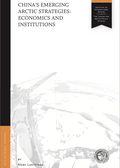
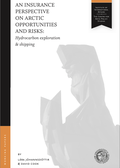
Chinese Chess in the Wild West: How Icelanders view the growing Iceland-China relationship
Jesse Hastings, Edward H. Huijbens, Gustav Pétursson and Jennifer Smith
2015
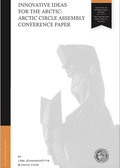
Innovative Ideas for the Arctic
Conference paper by Lára Jóhannsdóttir & David Cook
2017
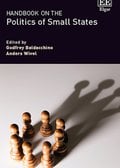
Public management and policy-making in small states
Külli Sarapuu and Tiina Randma-Liiv - Tallinn University of Technology, Ragnar Nurkse Department of Innovation and Governance
Project: NAS
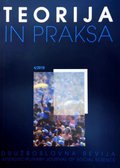
Small States and the Big European Migration Crisis: The Open Borders Challenge
Đana Luša - University of Zagreb
Project: NAS
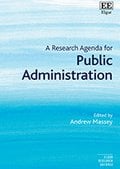
Public governance in small states: from paradoxes to research agenda
Tiina Randma-Liiv and Külli Sarapuu - Tallinn University of Technology, Ragnar Nurkse Department of Innovation and Governance
Project: NAS
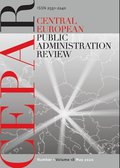
An Examination and Evaluation of Multi-Level Governance During Migration Crisis: The Case of Slovenia
Danila Rijavec and Primož Pevcin - University of Ljubljana
Project: NAS
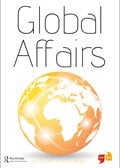
Forerunner, follower, exceptionalist or bridge builder? Mapping Nordicness in Danish foreign policy
Anders Wivel - University of Copenhagen
Project: NAS
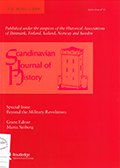
A Theory of Shelter: Iceland's American Period (1941-2006)
Baldur Thorhallsson, Sverrir Steinsson and Thorsteinn Kristinsson - University of Iceland
Project: NAS
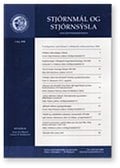
A small state in world politics: Iceland’s search for shelter
Baldur Thorhallsson – University of Iceland
Project: NAS

Report | Safeguarding Liberal Democracy in the Digital Age: Multiple Principles of Internal and External Policies on Countering Foreign Information Manipulation and Interference and Building Digital Sovereignty
This report examines the European Union's approach to managing disinformation and establishing digital sovereignty in response to trans-local information threats. The analysis evaluates the organising principles underlying the EU's approach, which seeks to control disinformation circulation while preserving liberal democratic values in an increasingly competitive geopolitical environment. The report focuses …

Populism and the Future of Transatlantic Relations: Challenges and Policy Options
This comprehensive ECPS report examines how the resurgence of right-wing populism—most notably under Donald Trump’s second presidency—reshapes the foundations of EU–US relations. Bringing together leading scholars, the report analyses the erosion of trust and shared norms across four pillars of the Atlantic order: security, trade, international institutions, and democratic values. …

Report | A Guide for EU Citizens Addressing the Risks of Disinformation
Authors: Elena García-Guitián (Universidad Autónoma de Madrid) & Luis Bouza-García (Universidad Autónoma de Madrid)
This guide helps citizens understand why the EU acts against disinformation, how these actions protect democracy, and what each of us can do to take part.

Report | RECLAIM Toolkit for Media Literacy
The RECLAIM Toolkit for Media Literacy, authored by Ricardo Castellini da Silva, Media Literacy Educator and Consultant, is a comprehensive resource designed to help educators, facilitators, and learners navigate today’s complex information landscape. The toolkit addresses the urgent challenges of misinformation, disinformation, and declining trust in democratic systems.

Report | RECLAIM FINAL CONFERENCE
On 27 June 2025, the Trans European Policy Studies Association (TEPSA) organised the Final Conference of the Horizon-Europe RECLAIM (Reclaiming Liberal Democracy in the Post-Factual Age) project, titled “Frontiers of Truth: Reclaiming liberal democracy in a post-factual world”. The conference fostered discussions between researchers, European Union (EU) policy-makers …

Report | Contestation over Truth Regimes: Russia, China and the US digital diplomacy on the Russian invasion of Ukraine
This report examines digital diplomacy campaigns by China, Russia, and the United States in selected EU member states. It analyzes how China and Russia use strategic narratives, disinformation, and propaganda to challenge established ‘truth regimes,’ heighten insecurity, and reshape perceptions—focusing on diplomatic tweets surrounding Russia’s invasion of Ukraine.

Report: Where do the Lies Lie: Analysing Post-truth Migration Discourses in European and Member State Parliamentary Debates
This report investigates how post-truth discourses on migration and border security are constructed, circulated, and embedded within parliamentary debates across six EU member states: Austria, France, Germany, Italy, Poland, and Spain, as well as the European Parliament.

Summary of the Research Community’s Contributions: Climate Change Adaptation
This report summarizes the key discussions and findings from the first of four workshops organized under a collaborative initiative by the University of Iceland, the University of Akureyri, the Icelandic Arctic Cooperation Network, and Rannís. The focus of this workshop was adaptation to climate change in Iceland, bringing together …

RECLAIM Skills Lab: "Media Literacy for Democracy”
Report from the RECLAIM Skills Lab. TEPSA organised a five-day Skills Training Lab entitled "Media Literacy for Democracy" for RECLAIM. The lab brought together 14 Master's students, graduates, and young professionals, from all around Europe selected through an open calll for applications.

Report – Art Exhibition: "Democracy in Frames"
In April 2024 TEPSA hosted an art exhibition titled “Democracy in Frames”, as part of the RECLAIM project. The exhibition celebrated the culmination of the Democracy in Frames art award themed “What does democracy mean to you?

Report: RECLAIM Breakfast Roundtable
Democracy through policy dialogue
This closed-door event aimed to facilitate a constructive and interactive dialogue between policy-makers and project researchers. Designed to connect RECLAIM's academic findings with practical policy needs, the event fostered open, small-group roundtable discussions.

Report of Midterm Conference
The RECLAIM midterm conference, hosted on 13 March 2024 by IIR Prague, focused on the role of journalism and regulation in addressing post-truth politics and reclaiming liberal democracy. Recording from the conference can be found on the RECLAIM website, reclaim.hi.is.
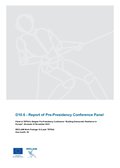
Report of Belgian Pre-Presidency Panel, November 2023
Report from the RECLAIM panel "Building Democratic Resilience in Europe" at TEPSA's Belgian Pre-Presidency conference in November 2023.
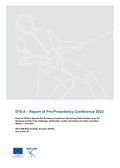
Report: Pre-Presidency Conference 2023
Panel at TEPSA’s Spanish Pre-Presidency Conference “Reclaiming Public Debates as an EU Response to Post Truth Challenges: Deliberation, quality information and citizen education”, Madrid, 1 June 2023
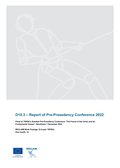
Report: Pre-Presidency Conference 2022
Panel at TEPSA’s Swedish Pre-Presidency Conference “The Future of the Union and its Fundamental Values”, Stockholm 1 December 2022
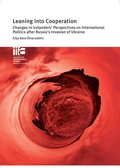
Leaning into Cooperation: Changes in Icelanders' Perspectives on International Politics after Russia's Invasion of Ukraine
Author: Silja Bára Ómarsdóttir
This report summarizes the main findings of the second iteration of a survey of Icelanders’ attitudes towards foreign affairs and international cooperation. The findings reflect a changed reality, as Russia’s war against Ukraine has shaken belief in the sanctity of borders and respect for international law. …
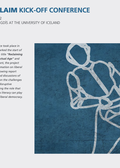
Report: RECLAIM Kick-Off Conference
The following report summarizes the main themes and discussions of the RECLAIM kick-off conference in Reykjavík.
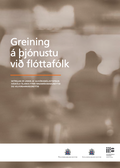
Integration of Refugees: Opportunities for Improvement
In the spring of 2016, the Institute of International Affairs and the University of Iceland were commissioned to work on a comprehensive analysis of the quality of integration of refugees and immigrants into Icelandic society by the Ministry of the Interior and the Ministry of Welfare. This is an abstract …
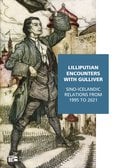
Lilliputian Encounters with Gulliver: Sino-Icelandic Relations from 1995 to 2021
Report by Baldur Thorhallsson, Professor of Political Science, and Snæfríður Grímsdóttir, Adjunct in Chinese Studies, on Sino-Icelandic Relations from 1995-2021
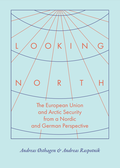
Iceland and the European Union: Arctic Security and Great Power Interest
Report on Iceland, the EU, and Arctic seucurity, conducted by Konrad Adenauer Stiftung, written by Pia Hansson and Guðbjörg Ríkey Th. Hauksdóttir.
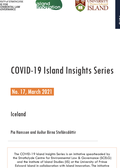
COVID-19 Island Insights Series - Iceland
The COVID-19 Island Insights Series is an initiative spearheaded by the Strathclyde Centre for Environmental Law & Governance (SCELG) and the Institute of Island Studies (IIS) at the University of Prince Edward Island in collaboration with Island Innovation. The initiative brings together critical assessments of how specific islands around the …
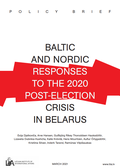
Baltic and Nordic Responses to the 2020 Post-Election Crisis in Belarus
Report on Baltic and Nordic Responses to the 2020 Post-Election Crisis in Belarus. This policy brief assesses the reactions of Denmark, Estonia, Finland, Iceland, Latvia, Lithuania, Norway and Sweden in light of the Belarus post-election crisis. The reaction of liberal democracies to popular uprisings in authoritarian countries of today echoes …
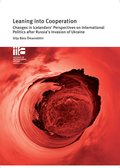
Pragmatic and Wary of Change: Icelanders' Views on International Cooperation
Author: Silja Bára Ómarsdóttir
This report provides an insight into the Icelandic people’s attitudes towards security and foreign affairs. The responses indicate a largely pragmatic view to economic cooperation, not necessarily challenging trading partners on political grounds when it might risk economic interests. This pragmatism also appears in attitudes towards …
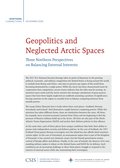
Geopolitics and Neglected Arctic Spaces: Three Northern Perspectives on Balancing External Interests
Finding a Niche for Iceland in the Post-Cold War Era
Margrét Cela and Pia Hansson
While the Arctic has been characterized more by cooperation than competition, recent events indicate that the tides may be turning. As attention turns north and the Arctic reenters the strategic calculations of great powers, spaces …
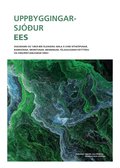
EEA Grants - Report
This report comprises the first in-depth analysis on the participation, challenges and opportunities of Icelandic entities in the EEA Grants. The research was conducted for the Institute of International Affairs at the University of Iceland, and overseen by its Acting Director and one of its Project Managers during the summer …
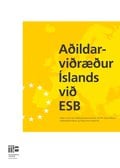
Iceland's Accession Talks with the EU
Á haustmánuðum 2013 var leitað til Alþjóðamálastofnunar Háskóla Íslands um úttekt á aðildarviðræðum Íslands við Evrópusambandið. Verkbeiðendur eru Alþýðusamband Íslands, Samtök atvinnulífsins, Félag atvinnurekenda og Viðskiptaráð Íslands. Markmið verkefnisins er að leggja mat á stöðu aðildarviðræðna Íslands við Evrópusambandið, að greina þau álitaefni sem eru til staðar og þá kosti …
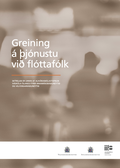
Integration of Refugees: Opportunities for Improvement
In the spring of 2016, the Institute of International Affairs and the University of Iceland were commissioned to work on a comprehensive analysis of the quality of integration of refugees and immigrants into Icelandic society by the Ministry of the Interior and the Ministry of Welfare.
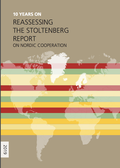
10 years on Reassessing the Stoltenberg Report
In this review, we revisit these thirteen proposals and ask: How important was the 2009 Stoltenberg Report for boosting Nordic foreign and security policy cooperation? What progress can we observe in the decade that has passed since the report was released?
Reykjavík Peace Days: Peace, Displacement and Climate Change
Will climate change lead to more violence and conflict? What can we do to battle climate change and prevent conflict? Are we doing enough?
Reykjavík Peace Days: Iceland's Voice in the International Arena?
In this podcast we discuss Iceland’s capability, as a small state, to take on a leadership role in the international arena. Does Iceland have a strong voice within the international society? How can we shape the discussion and lead actions to tackle gender-based violence, violence against children and promote sustainable …
Reykjavík Peace Days: Children in Icelandic Conflict Zones
In this podcast we discuss the situation of children in Icelandic society, what resources are available for children living in insecurity, and for those who have endured violence or neglect. What effect has COVID-19 had on the safety of children in Iceland? How can people help?
This episode was produced …
Reykjavík Peace Days: The War at Home
In this podcast we discuss gender-based violence, its root causes and consequences. Who are the perpetrators and how can we create an open dialogue with them? Do we find peace in Icelandic homes?
This episode was produced in collaboration with UN Women in Iceland.
The podcast is in Icelandic and …
Reykjavík Peace Days: What is Peace?
What is Peace? In this podcast we discuss the concept, what meaning it has for us as individuals and society and how we understand it here in Iceland.
The episode is in Icelandic and it is a part of the Reykjavík Peace Days 2020 podcast series produced in collaboration with …

RECLAIM POLICY PAPER ON NEW AND STUDENT- CENTERED EDUCATION TOOLS
Authors: Federico Castiglioni (IAI) - Alessia Chiriatti (IAI)
This policy brief examines the relationship between Citizenship Education and learning mechanisms in the postfactual age, with a specific focus on the European dimension. In the recent years, the debate among scholars and practitioners has intensified around how to address the multiple …

RECLAIM Policy Brief - Protecting Quality Journalism and Media Freedom
Project: RECLAIM
- The independence and freedom of the media must be safeguarded by protecting professional journalism from unrestrained market forces and negative state interference. The EU has a special role to play in securing this aim.
- The EU should provide funding opportunities for media that uphold high standards of reporting, …

RECLAIM Policy Brief - Priming Politicians for Post-Truth
Project: RECLAIM
- The most prominent narratives put forward on migration and border policy in a number of European parliaments (Italy, Poland, Germany, Austria, European Parliament) have not only become more hostile towards migrants but are increasingly disconnected from facts and evidence-based knowledge.
- By their own account, mainstream politicians have a …

RECLAIM Policy Brief - EU Defence of Democracy
Project: RECLAIM
- Disinformation as a Democratic Threat and the Need for a Holistic Response: The EU views disinformation not just as misleading content, but as a systemic threat to its core democratic values—democracy, human rights, and the rule of law. In response, it has adopted a comprehensive and evolving strategy …

RECLAIM Policy Brief - Empowering Citizens in a Changing Media
Project: RECLAIM
- Citizenship education in Europe constitutes a mosaic of different national and subnational approaches. In order to empower citizens against a manipulative media and information environment, more and better coordination at the EU level is necessary while at the same time respecting national and subnational competences in the area …

RECLAIM Policy Brief - Countering FIMI through Digital Diplomacy in Europe
Project: RECLAIM
- The EU has to develop sufficient capabilities to defend its interests and project its values on the international stage even under post-truth conditions. Developing effective digital diplomacy skills and capabilities is an indispensable part of this effort. This should entail coordinated communication efforts to build a community of …

RECLAIM Policy Brief - A New Governance Regime for Social Media
Project: RECLAIM
- Disinformation campaigns on social media are aimed at disrupting liberal democracies, creating distrust amongst citizens in their democratic institutions and intensifying political/affective polarisation.
- The spread of disinformation and ‘fake news’ – particularly on social media – undermines the public sphere and severely inhibits the ability of citizens to …
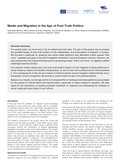
Media and Migration in the Age of Post Truth Politics
Authors: Gwenaëlle Bauvois, Niko Pyrhönen and Suvi Keskinen, The Centre for Research on Ethnic Relations and Nationalism (CEREN), Swedish School of Social Science, University of Helsinki, Finland
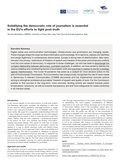
Solidifying the democratic role of journalism is essential in the EU’s efforts to fight post-truth
Authors: Asimina Michailidou (ARENA, University of Oslo); Hans-Jörg Trenz (Scuola Normale Superiore, Italy)
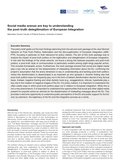
Social media arenas are key to understanding the post-truth delegitimation of European Integration
Author: Maximilian Conrad, Faculty of Political Science, University of Iceland
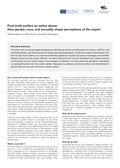
Post-truth politics as online abuse: How gender, race, and sexuality shape perceptions of the expert
Authors: Charlotte Galpin and Patrick Vernon, University of Birmingham
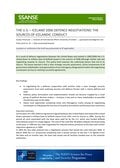
The US-Iceland 2006 Defence Negotiations: The Sources of Iceland Conduct
Gustav Petursson - University of Iceland
Project: SSANSE
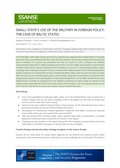
Small State’s Use Of The Military In Foreign Policy: The Case Of Baltic States
Margarita Šešelgytė - Vilnius University
Presented at the conference: ‘Small States and the Changing Global Order: New Zealand Faces the Future’ at University of Canterbury, Christchurch, New Zealand, 3-4 June 2017
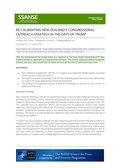
Re-Calibrating New Zealand’s Congressional Outreach Strategy in the Days of Trump
Alan Tidwell - Georgetown University
Presented at the conference: ‘Small States and the Changing Global Order: New Zealand Faces the Future’ at University of Canterbury, Christchurch, New Zealand, 3-4 June 2017
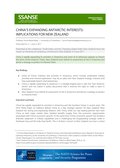
A China’s Expanding Antarctic Interest: Implications for New Zealand
Anne-Marie Brady - University of Canterbury
Presented at the conference: ‘Small States and the Changing Global Order: New Zealand Faces the Future’ at University of Canterbury, Christchurch, New Zealand, 3-4 June 2017
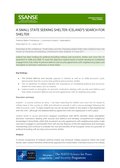
A Small State Seeking Shelter: Iceland’s Search For Shelter
Baldur Thorhallsson - University of Iceland
Presented at the conference: ‘Small States and the Changing Global Order: New Zealand Faces the Future’ at University of Canterbury, Christchurch, New Zealand, 3-4 June 2017
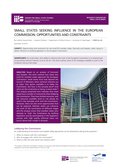
Small States Seeking Influence in the European Commission: Opportunities and Constraints
Caroline Grön - University of Copenhagen
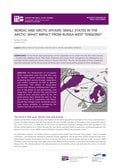
Nordic and Arctic Affairs: Small States in the Arctic: What Impact From Russia-West Tensions?
Alyson JK Bailes - University of Iceland
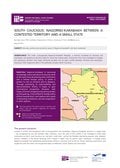
South Caucasus: Nagorno-Karabakh Between a Contested Territory and a Small State
Urban Jaksa - University of York
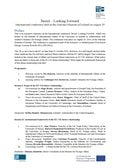
Brexit – Looking Forward
Summary report from final conference in Reykjavik on 29 August 2019
Project: PELEEA
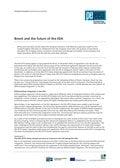
Brexit and the future of the EEA
Christian Frommelt, Director of the Liechtenstein Institute
Project: PELEEA
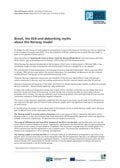
Brexit, the EEA and debunking myths about the Norway model
John Erik Fossum and Hans Petter Graver, ARENA Centre for European Studies at the University of Oslo
Project: PELEEA
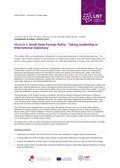
Module 5: Small State Foreign Policy - Taking Leadership in International Diplomacy
This module offers a comprehensive introduction to small state leadership in international diplomacy. The module will introduce students to the literatures on foreign policy analysis and small state foreign policy and build on these general insights when zooming in on small state leadership in foreign policy and diplomacy
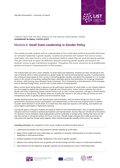
Module 4: Small State Leadership in Gender Policy
This module provides students with an understanding of how small states perform and profile themselves on normative leadership in gender equality. Students are presented with research from and on various small states, who have found a niche in international relations where they can excel and lead by example.
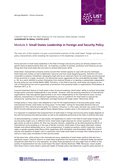
Module 3: Small States Leadership in Foreign and Security Policy
The main aim of this module is to give a concentrated overview of the small states’ foreign and security policy characteristics while revealing the importance of the leadership component in it.
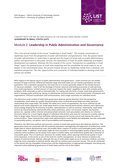
Module 2: Leadership in Public Administration and Governance
This is the second module of the course “Leadership in Small States”. The module concentrates on leadership issues from the perspective of public administration and governance.
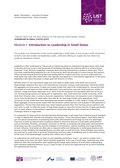
Module 1: Introduction to Leadership in Small States
This module is an introduction to the course Leadership in Small States. It aims to give a brief introduction to both small state studies and leadership studies, while also offering an insight into how these two academic standpoints interact
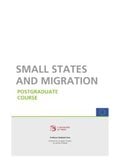
Small States and Migration
The study of migration from a small state perspective remains an undeveloped field. This course offers an inter-disciplinary approach to this subject.
Project: TCDA
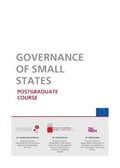
Governance of Small States
The course is designed to introduce postgraduate students to the realm of small state governance.
Project: TCDA
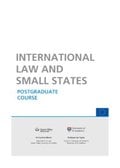
International Law and Small States
This course is designed to introduce postgraduate students to the study of small states and international law.
Project: TCDA
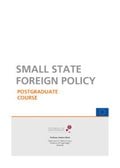
Small State Foreign Policy
The aim of the course is to offer a comprehensive introduction to small state foreign policy to postgraduate students.
Project: TCDA

Annáll Alþjóðamálastofnunar 2022
Líkt og undanfarin ár bauð Alþjóðamálastofnun Háskóla Íslands upp á fjölbreytta fræðslu og upplýsta umræðu um alþjóðamál eins og sjá má í samantekt yfir starfsemi stofnunarinnar árið 2022 sem fylgir hér með í viðhengi.
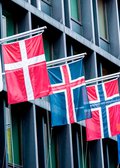
Importance of Nordic Research Cooperation
Nordic research cooperation is more important than ever in a rapidly changing world. This article by the directors of the Nordic Institutes of International Affairs offers concrete proposals for developing cooperation.
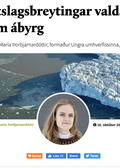
Loftslagsbreytingar valda flótta og neyð og við erum ábyrg
Þorgerður María Þorbjarnardóttir, formaður Ungra umhverfissinna skrifar grein í tilefni af Friðardögum í Reykjavík
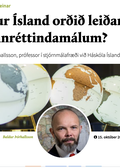
Getur Ísland orðið leiðandi í mannréttindamálum?
Baldur Þórhallsson, Professor in Political Science at the University of Iceland
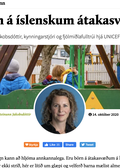
Börn á íslenskum átakasvæðum
Steinunn Jakobsdóttir, media representative at UNICEF Iceland writes and article in relation to Peace Days in Reykjavík
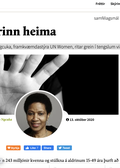
Ófriðurinn heima
An article by Phumzile Mlambo Ngcuka Executive Director of UN Women in relation to Peace Days in Reykjavík
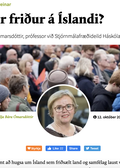
Ríkir friður á Íslandi?
Silja Bára Ómarsdóttir, professor of International Affairs writes an article in relations to Reykjavík Peace Days
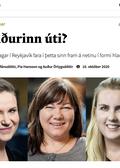
Er friðurinn úti?
An article written about The Imagine Forum and the peace days in Reykjavík 2020 that will take place in October, as in recent years, but this time they will take place entirely online, under the heading "Er friðurinn úti?"
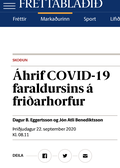
The Effects of COVID-19 on Peace
An article by Jón Atli Benediktsson, Rector of the University of Iceland og Dagur B. Eggertsson, Mayor of Reykjavík on International Day of Peace (in Icelandic)
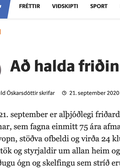
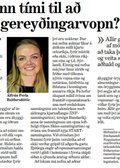
Time to talk about weapons of mass destruction
An article by Álfrún Perla Baldursdóttir published on the International day of Peace

Coronakrisen illustrerar den postfaktiska politiken
Maximilian Conrad on the importance of studying post-truth politics in the context of the ongoing Corona crisis (in Swedish).